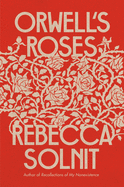
It is no surprise that a writer as talented as Rebecca Solnit (Recollections of My Nonexistence: A Memoir) considers George Orwell, who once wrote that "good prose is like a windowpane," to be "a foundational influence on my own meander toward becoming an essayist." In Orwell's Roses, she repays some of her debt by viewing her subject's work through the prism of his connection to the natural world.
Solnit's touchstone is the roses Orwell planted, in 1936, at the cottage he rented in the Hertfordshire village of Wallington and that he occupied intermittently until he moved to an island off Scotland's west coast, where he spent the last four years of his life. For Solnit, the flowers were "invitations to dig deeper" into "who [Orwell] was and who we were and where pleasure and beauty and hours with no quantifiable practical result fit into the life of someone, perhaps of anyone, who also cared about justice and truth and human rights and how to change the world."
Unlike a conventional biography, Orwell's Roses is an impressionistic journey through highlights of what Solnit calls Orwell's "notably episodic" life. She devotes close attention to the months Orwell spent in the depressed areas of northern England, and especially the "lurid misery" of its coal mines, that produced The Road to Wigan Pier. She also offers an incisive analysis of Nineteen Eighty-Four.
There's no way to predict whether history someday will accord Rebecca Solnit's work the same respect George Orwell's has earned. Regardless, readers of the early 21st century should be grateful for her clear-eyed, articulate presence in our midst. --Harvey Freedenberg, freelance reviewer

